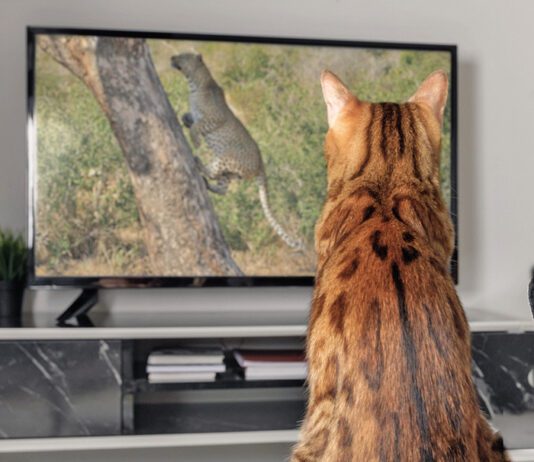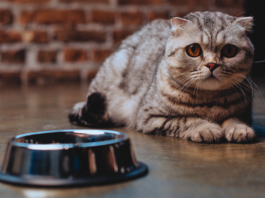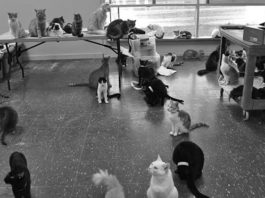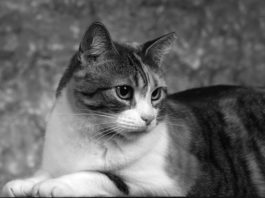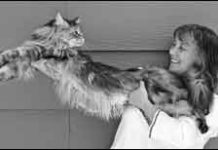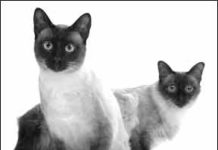Short Takes: May 2013
A study published earlier this year that estimated free-ranging domestic cats annually kill up to 3.7 billion birds and 20.7 billion mammals has stirred controversy and brought renewed calls for action.The study’s three authors from migratory bird centers at the Smithsonian Conservation Biology Institute and U.S. Fish and Wildlife Service conducted a “systematic review and quantitative estimate of mortality.” They say “unowned cats,” as opposed to owned pets, cause the majority of the deaths.
What Happens If You Go First?
Outliving your cat is painful, but it’s the natural order, given the comparatively short feline lifespan. More difficult, and more crucial, to contemplate: What happens if you go first? Preparing for that contingency shouldn’t be done casually. You need to be specific about your wishes to make sure they’re enforceable by law and to back up your plans with money designated for your cat’s care. The good news: Most states now have laws recognizing pet trusts. Quite simply, a pet trust is a legal arrangement that lets you designate assets, such as insurance policies, real estate, cash or a retirement fund, for the care of your cat in the event of your disability or death. You can leave assets only to a living person, says Gregory S. Alexander, J.D., Robert Noll Professor of Law at Cornell University and an internationally renowned expert in property law and theory. As a result, “You have to find someone to receive the legal title to the property [the assets] that you’re going to use to benefit the pet, and you have to find somebody willing to use that property to look after the pet.”
How Lost Animals Find Their Way Back Home
Heartwarming reports of lost dogs trekking miles back home regularly make the news. Now it’s a cat’s turn. Most recently: Holly, an indoor cat who bolted from her owners’ RV at Daytona Beach. Two months — and 190 miles later — an emaciated Holly arrived a mile from her West Palm Beach home. A woman took her to a veterinarian who found a microchip with the owners’ information.
Ask Elizabeth: March 2013
As you know, we cats are very sensitive creatures, but in your case, as with other cats with feline hypersensitivity syndrome (FHS), this sensitivity seems to be ratcheted up. FHS is a recognized syndrome in the feline world, although the definitive cause is not clear. While it is not, in and of itself, believed to seriously affect overall health or longevity, a few important points regarding this unusual behavioral syndrome are worth making, especially for our human friends who are commonly puzzled by its manifestations. FHS, also variably referred to as rolling skin syndrome and atypical neurodermatitis, is characterized by dramatic twitching or rippling of the skin, most commonly on the back between the middle of the spine and the base of the tail or in the flank region, with intermittent jerking of the body and exaggerated tail movements.
You Can Prevent This Serious Disease
If you’ve resisted brushing your cat’s teeth, knowing how strenuously he’s likely to object, consider this: Periodontal disease, an often painful inflammation of the gums that can result in bone loss and destruction of oral tissue, is extremely common. In fact, it’s the most prevalent disease in companion animals and can pose serious health threats. “Periodontitis has been shown to play a role in such health problems as cardiovascular disease and diabetes,” says dental specialist Santiago Peralta, DVM, a Lecturer in Dentistry and Oral Surgery at the Cornell University College of Veterinary Medicine. This disease is, however, entirely preventable, according to the American Veterinary Dental College (AVDC). The best way to prevent periodontitis is by regular brushing and professional dental care.
‘Kitty cams’ reveal their hidden world
Two thousand hours of video recorded by “kitty cams” from the National Geographic Society have uncovered the lives of indoor cats who are allowed outdoors.
Kitty cams reveal their hidden world
Two thousand hours of video recorded by “kitty cams” from the National Geographic Society have uncovered the lives of indoor cats who are allowed outdoors.
Holiday Overload Can Affect Their Health
With shopping, traveling and entertaining, the weeks between Thanksgiving and New Year’s can be anything but relaxing. However, humans aren’t the only individuals to suffer holiday overload. Cats can also become stressed, and if prolonged, the stress can result in changes in health and behavior. “I could write a book about the physiology of stress,” says Germain F. Rivard, DVM, Ph.D., a resident in behavioral medicine at Cornell University College of Veterinary Medicine. “A cat under stress would change personality as he loses his coping mechanisms. Often, the reaction is avoidance with or without vocalizations, and if the cat cannot escape, he defends himself aggressively. That’s why it is important to create a safe place ahead of time.”
In The News: October 2012
Wollie, a 3 -year-old black cat, made national news when he walked six miles to find his way home from an animal shelter in Bedford, N.H. Barbara Oliphant had taken in the stray but gave him up when her husband became ill. When her husband improved, Oliphant’s daughter adopted Wollie as a surprise for her, but the cat escaped his carrier in the shelter parking lot. He appeared at Oliphant’s door three days later. The inevitable question: How did he do that? Behaviorist Katherine A. Houpt, VMD, at Cornell offers the likely explanation: “He was a stray and familiar with the area.”
A Commitment to Improving Well-being
Imagine veterinarians being able to sterilize feral cats by vaccination instead of surgery. Or to identify the connection between a relatively benign form of feline coronavirus and feline infectious peritonitis, which is nearly always fatal, with the hope of finding ways to diagnose and combat it. Or discover how and why vaccine-associated sarcomas may trigger DNA damage in some cats and how this damage may be used to predict which cases of the sarcomas are amenable to chemotherapy. These are just three of the many scientific studies funded by the Cornell Feline Health Center where, under the guidance of Director Colin Parrish, Ph.D., Professor of Virology, the goal of bettering the health of cats continues to be the focus and commitment, as it has been since the center opened its doors in 1974.
Is Your Cat Afraid of Strange Noises?
Whenever cat owner Susan Lomond turns on her printer, her cat Sylvester dashes over to sit on it, lie on it and watch in fascination as the paper comes out. But when Susan’s friend Diana turns on her printer, her cat, Petra, flees in terror. Cats respond differently to noise depending on their personalities and experiences — and even their genetics. When cats get scared of noise, we often feel the need to soothe them. Actually, that may not be helpful. How to Help Your Cat. Cats differ from dogs when it comes to being frightened by noise. Dogs are notoriously afraid of thunder and fireworks, and will often try to escape from the house in a panic. Cats are more likely to be scared of unexpected noises around the house, such as the vacuum cleaner, construction work or a hair dryer. “But thunder and fireworks don’t seem to bother cats,” says Katherine A. Houpt, VMD, PhD, the emeritus James Law Professor of Animal Behavior at Cornell University’s College of Veterinary Medicine. “I have never seen fireworks or thunder phobia in cats,” she says.
Movies for Cats: A Good Daytime Baby Sitter
A bored cat is often an unhappy cat. Just like humans, cats need stimulation; when left on their own too long, they can experience loneliness and even depression. An unhappy cat may lose or gain weight, stop grooming itself or even become destructive. And a cat with nothing to do will often sleep the day away instead of getting needed exercise. For those of us who must leave our pets alone for long hours while at work or elsewhere, the solution could be just a click away: Turn on the TV and put on a movie designed just for cats.

